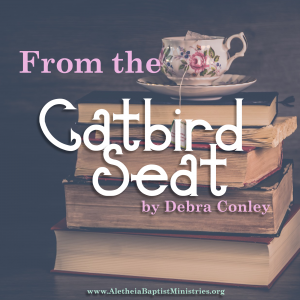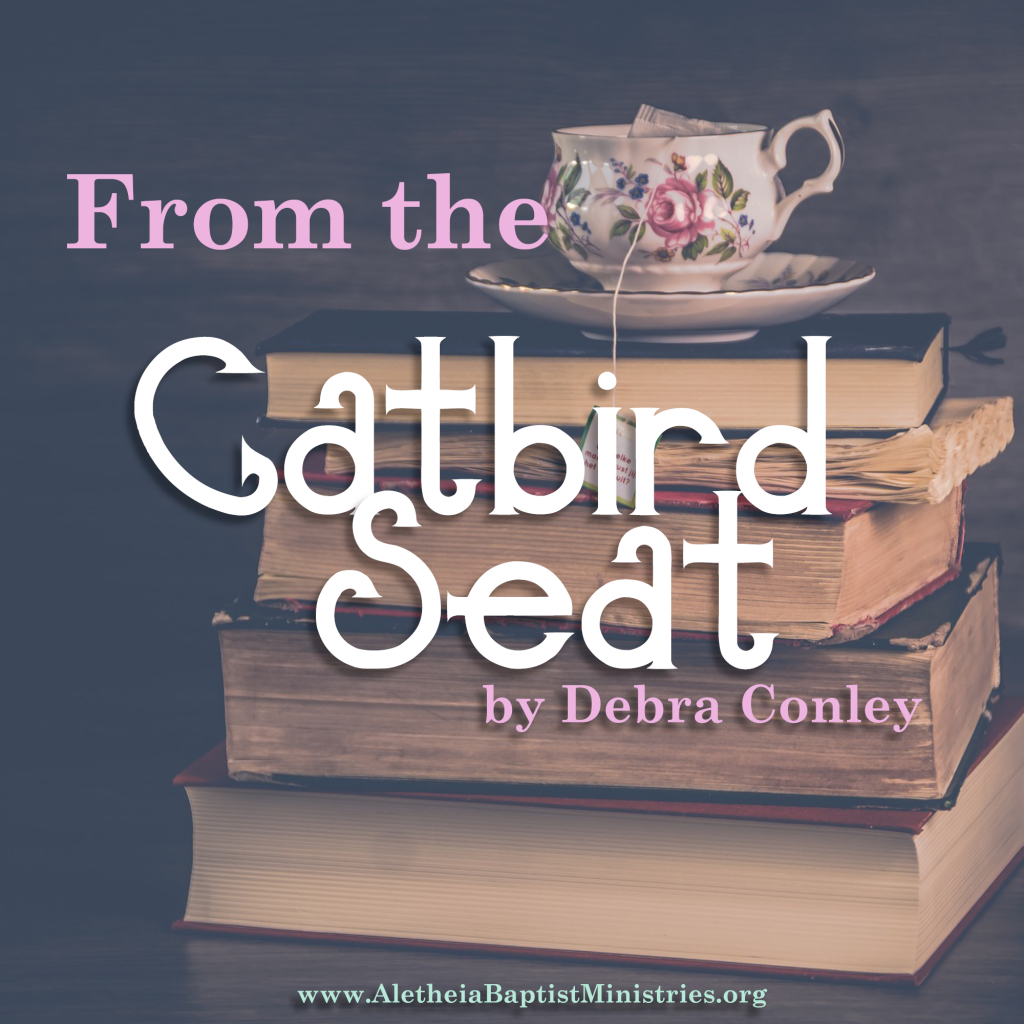
Debra Conley is a retired literature teacher and now edits, writes and consults in various capacities. Her 25+ years of classroom experience both in public and private institutions provides us with a professional and much needed perspective. How are we training up the next generation both in the traditional school setting and in Sunday School? What can we do better? Where do I find education resources?
“From the Catbird Seat” is a collection of articles specifically geared toward elementary school and high school learning.
The omniscient view, as this column’s title phrase suggests, is not within the human realm. My hope, however, is to draw upon 25+ years of classroom instruction in both public and private institutions, as well as my experience as curriculum director and home-school implementation coordinator. This experience has provided valuable insights into core curriculums that work, ones that do not, and supplemental programs which you as a parent may find needful and helpful. I will also continue to review books for you, especially with the idea of using such books in supplement to your current public, private, or home-school study program. Those book reviews are included in “The Book Shelf”.
What is “core” curriculum? This refers to the primary resource for learning a subject that an instructor or school system has chosen to use. It should have a name — Harcourt Brace or A Beka, for example. It should be designed to supply certain minimum learning steps and or premises of each primary subject. These primary subjects are math, science, language, and social studies/history.
In the February 2001 issue of Aletheia, I will begin a series advising you about what to look for in a core curriculum and how to evaluate if it is a good program.
- Lurlene McDaniels – June 2, 1997
- Occultic Children’s Books – July 2, 1997
- Short Stories – November 2, 1997
- Pearl S. Buck – December 2, 1997
- Sir Arthur Conan Doyle – April 2, 1998
- Beverly Cleary – June 2, 1998
- Elisabeth Massie – July 30, 1998
- Lucy Maud Montgomery – August 30, 1998
- Greek and Roman Literature – November 30, 1998
- Greek Classics – December 30, 1998
- Sophocles – January 30, 1999
- Fairy Tales – March 30, 1999
- Intro to Core Curriculums – February 23, 2001
- Success in Education – March 30, 2001
- Homework – April 30, 2001
- Researching Curriculum – May 30, 2001
- Assessing Your Child’s Education – July 20, 2001
- Charter Schools – September 30, 2001
- Learning Gaps – October 30, 2001
- Integrated Curriculum Ideas – November 30, 2001
- Homeschooling – January 30, 2002
- Abeka Curriculum – February 23, 2002
- Alpha Omega Curriculum – March 30, 2002
- Challenged Learners – April 30, 2002
- Listening Skills – May 30, 2002
- Kindergarten for the First Time – June 30, 2002
- Kindergarten Supplemental Materials – July 30, 2002
- The Library – September 30, 2002
- Superman and Supernatural – October 30, 2002
- Fast Learners – November 30, 2002
- The SAT Crisis – January 30, 2003
- Reading – February 28, 2003
- Reading Comprehension – March 30, 2003
- Textbook “Facts” – April 30, 2003
- Speed Reading – May 30, 2003
- F. Scott Fitzgerald – August 30, 2003
- Critical Thinking Skills – September 30, 2003
- Disney and History – October 30, 2003
- Distorting American History – November 30, 2003
- T.S. Eliot – December 30, 2003
- Ernest Hemingway – January 30, 2004
- Leo Tolstoy – February 28, 2004
- Society’s Values – March 30, 2004
- Plato – April 30, 2004
- Studying Philosophy – May 30, 2004
- Studying Ancient Philosophers – June 30, 2004
- Music and Critical Thinking – July 30, 2004
- Choosing a Life Profession – August 30, 2004
- Ancient Literature – October 30, 2004
- Misues of Biblical Allusions – November 30, 2004
- Reading at an Early Age – January 30, 2005
- Reluctant Readers – February 28, 2005
- Condensed Works – March 30, 2005

